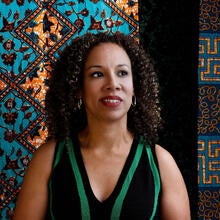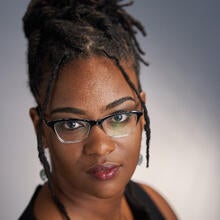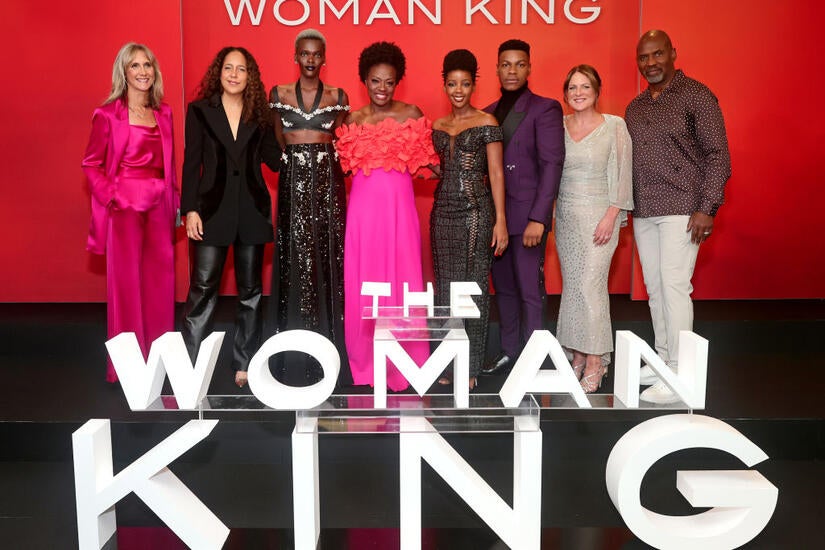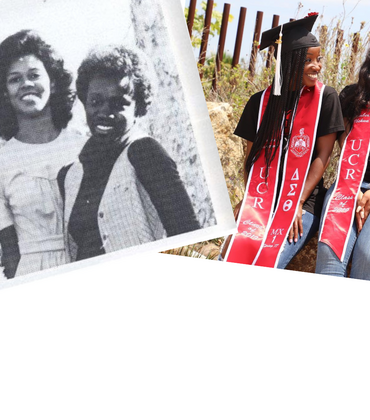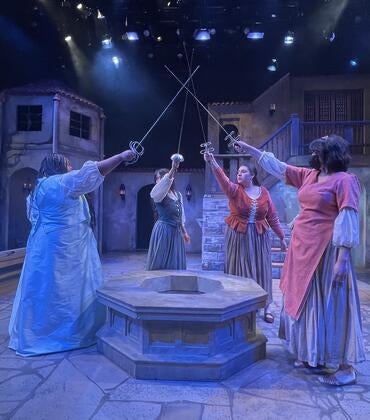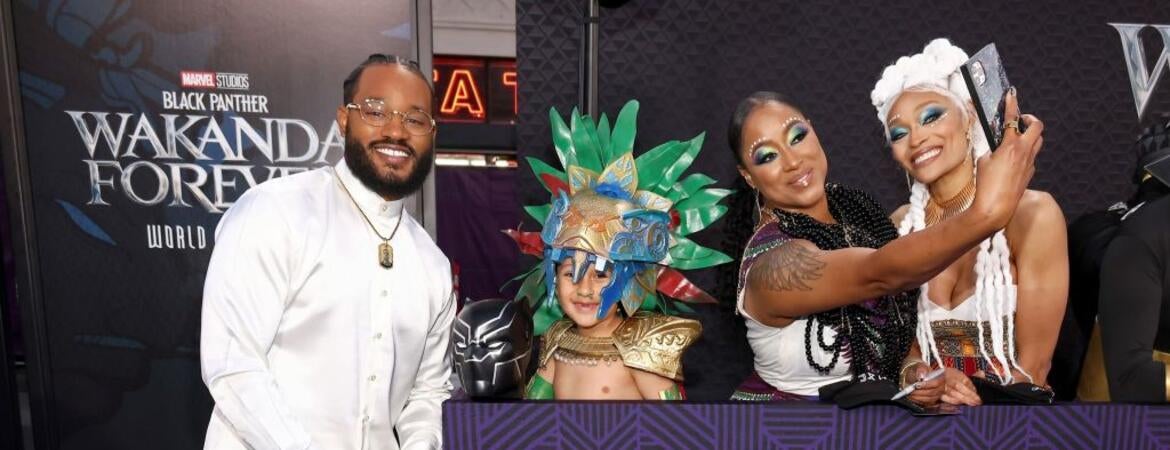
With the Oscars around the corner, films such as “Black Panther: Wakanda Forever” and “The Woman King” have landed on entertainment and film critics’ Oscars prediction lists. Do recent films focused on Black stories — those that include Black protagonists and cultures — demonstrate that Hollywood has made a meaningful shift to diversify what audiences see on the big screen?
UC Riverside English faculty — all experts on film, media, and culture — share their thoughts regarding what might be a mile marker in American cinematography and popular culture. Participating faculty include Courtney Baker, an associate professor whose research interests include visual culture and Black life; Jalondra Davis, an assistant professor whose research areas include Black mermaids, Black cultural politics, and political thought in speculative fiction; and andré carrington (carrington prefers to spell his first and last name in lowercase), an associate professor whose research includes race, gender, and genre in Black and American cultural production.
Has something shifted in Hollywood that we are now seeing more Black stories on the big screen?
Courtney Baker: Yes and no. There are a number of factors at play, including the challenge that streaming services have brought to the studios along with alternative outlets like YouTube that can platform shows like Issa Rae’s “Awkward Black Girl” which gained such a significant audience that mainstream production and distribution companies had to take notice. We are also seeing the realization of generations of work in the industry that has moved some power into the hands of Black filmmakers like Viola Davis, Ava DuVernay, and Jordan Peele who have built their own production companies to focus on and support Black content.
Jalondra Davis: I remember the 1990s being a golden age of Black movies. Not only the comedies and the inner-city-set films but independent films that did well. People found lots of different kind of movies by word-of-mouth and at the video store. But those movies were marketed to Black audiences. I think what we are seeing now is more Black stories marketed to general audiences and more Black representation in stories and genres that have excluded us.
andré carrington: There are more Black film producers and studio executives than there were a generation ago, which makes a difference in which projects get produced. But I am also sure that the challenges of getting distribution to put movies in theaters are persistent. The new possibilities that streaming services represent come with their own barriers to access and limits on how widely available they make the full range of the content they have to offer.
What themes do “Till,” “Black Panther: Wakanda Forever,” “The Woman King,” and “The Little Mermaid” highlight? What can society learn from these themes?
Baker: I wouldn’t call what binds these films together as themes — there is a world of difference between the stories of “Till” (a fictionalized adaptation of a true story occurring in Jim Crow U.S. in 1955) and “The Little Mermaid” (a European folk tale) — but a recognition that blackness is itself wildly diverse and not a limited genre stuck in, for instance, the urban social realism of the 1990s Hood Films (“Menace II Society,” “Boyz in the Hood,” “Dead Presidents”). This is not to say that those films were bad, but that we are seeing that Black characters are not alien or alienating to the great diversity of film genres and narratives we enjoy, from the historical drama of “The Woman King” to the superhero blockbuster of the Black Panther films, to children’s animated fare such as “Wendell and Wild,” horror films like “Candyman,” and so much more.
Davis: These are all very different films, so I think the themes are very different. And we haven’t seen “The Little Mermaid” yet so I don’t know what, if any changes might be made to the story to update it for contemporary audiences. “The Little Mermaid” is also different from these other films in that it is a matter of casting into an existing story rather than a story being written and intended as a Black story. So, it is less likely to speak to the contemporary political contexts that these others are hinting at and trying to capitalize on.
But one thing that seems to connect these films is a focus on Black women being depicted not as invisible, not just on the periphery, not just as supporting characters supporting others’ emotional and narrative needs, but in the center: the activists, the queens and warriors and rulers, and even the fairy tale princess. “Till” is about this very painful, and historically important story of the murder of a Black child, but it is centered around Mamie Till: her hopes, her fears, her joy in and pride and love for her child and her courage even as she grieves for him, the way that courage is actually driven by the grief. I don’t want to compare “Till” directly to a speculative film like “Wakanda Forever” or highly fictionalized action film like “The Woman King,” but I do see this centering of Black women and their resistance in the midst of vulnerability and grief as a recurring theme across these.
carrington: These movies are so different — the diversity of themes and genres across these movies goes to show that Black lives are full of possibilities and our imaginations are incredible, too. I especially love seeing Gina Prince-Bythewood (“The Woman King”) and Ryan Coogler (“Wakanda Forever”) out here defining contemporary cinema, as someone who has enjoyed all the movies they’ve both made.
Is pop culture a way to broaden the conversation regarding racial justice?
Baker: What I have come to appreciate in my studies of Black media representation is that pop-culture is always already about issues of what culture values. In that regard, blackness has always been central to the representation of racial justice, even though much of media history figured Black lives as at best ornamental if not an outright threat to racial justice, as D. W. Griffith’s infamous 1915 film “Birth of a Nation” makes clear. And yet, even then, Black scholars, activists and — most importantly — filmmakers recognized the importance of film as a terrain of contestation over the representation of racial justice. The NAACP launched an impactful campaign against the misinformation depicted in Griffith’s film, and the pioneering African American filmmaker Oscar Micheaux, who was already making race films for Black audiences, created his own film addressing the scourge of lynching that “Birth of a Nation” celebrated in his own film, “Within Our Gates” in 1920. Racial representation has consistently been a subject, not only for filmmakers but also for Black activists, and was the focus of many discussions and critiques in the 1970s. In the 1960s, Martin Luther King, Jr. and the Student Nonviolent Coordinating Committee recognized the importance of visual media and incorporated it into their activism, going so far as to notify television outlets and journalist about their protests in advance.
Davis: It can be but will always be a highly limited way to do so. Hollywood films prioritize simplified narratives that tend to align us with a more conservative, or at least moderate politics. For example, both Black Panther films have depicted battles among Black and Indigenous peoples rather than a direct challenge to the white supremacist powers that lead to those conflicts. On one hand I think this may be intentional on the part of Ryan Coogler to reduce the white gaze in the films by not even having prominent white antagonists. Like, whiteness and white people are not the only issues we have in our lives. You do wonder how Euro-western colonialism and exploitation and violence can ever be fully addressed when the larger Marvel Cinematic Universe and bands of superheroes that Black Panther is a part of is so much organized around Western interests.
There have also been critiques of the “Woman King’s” distortion of the history of the slave trade and the Dahomey Kingdom, to fit that history into the kind of Hollywood narrative that an audience can root for. These big, expensive film projects that need so many levels of authorization and approval and to tell a cohesive and familiar story to audiences don’t make room for a lot of nuances. That being said, I am not going to be harder on Black films than I am
on things I watched growing up where white men were the heroes of these simplified victorious narratives. I still love these films and appreciate that they exist. The film can be a start — there are so many important histories and movements that these films reference and the greatest hope is that people will be inspired to do their own research and develop more complicated, critical perspectives.
carrington: Yes, and not just in the entertainment industry. Everything that makes up “culture” in our everyday lives is informed by unequal power relationships between groups of people that are shaped by history and that we can change through our actions, collectively: the stories we tell, the way we dress, the public figures and fictitious icons we recognize and what we say about them, the memes we share, the news stories we react to, the food we try, the places we go.
Do films such as these provide genuine insight to African American identity and culture?
Baker: We should be very careful not to screen for (and screen out) representations of African Americans as inauthentic since there is no single way to be African American. On the one hand, “Black Panther” and “The Woman King” tell us something about Black history and experience, but even those films have been at the heart of debates around accuracy rather than about the diversity and conflicts over Black values and desires. Taken together, these films give us insight into the creative capacities of Black and African American filmmakers and storytelling within the film media much more than they tell us anything certain about identity and culture.
Davis: The more Black people are in control of different aspects of the production, the more likely that they can provide insight, but that doesn’t guarantee it. You can usually tell when Black creators and voices are involved with something because it won’t be the big stuff that rings the most true. It will be the details that those raised in Black families and communities are more likely to recognize: the Black man head nods, the handshakes, the posters on the wall, the throwback song playing, a hairbraiding scene where the actor braiding actually looks like they are really pulling different sections of hair into one, the inside jokes. Also, should the goal of film be to provide insight to a particular culture? I feel like a better question is, are Black creators getting the resources and access to tell different stories? How are they being constrained by everything that surrounds the production and distribution and target audiences of these films? How do they signify and embed and hide messages, which is something Black art has always done to work around the white gaze?
carrington: Definitely — “Till,” for example, is not just the factual story of a victim of a crime, but a true story about the love and the care that Black parents and communities have for their children. And “The Little Mermaid” with a Black lead is a reminder that Black kids sing songs and dress up in pretty costumes, because beauty and joy are part of our identity, and so is the ocean.
From the business perspective, has Hollywood realized Black stories sell tickets? Is this an untapped market?
Baker: Frankly, it seems that Hollywood has known that Black stories sell tickets for a long time but has worked to suppress that truth. Hollywood invested in Blaxploitation fare to save the industry just until enough movie theaters were built in the suburbs so that they no longer had to rely on inner-city African American audiences to buy movie tickets. The old line has also been that international audiences — a market in which studios could significantly recoup their profits — were not interested in African American content. We have long seen that not to be true with the global appeal of Hip-Hop, for instance, but now the studios in particular have been confronted with what the music industry has long known, what the fashion industry has figured out, and what independent and streaming outlets have made known: Black stories and Black style are where it’s at!
Davis: The business perspective is not my expertise. But I think that the first Black Panther shattered a lot of records and with it a lot of myths and assumptions about films centering Black people and the kinds of Black films that could be mass-marketed and made way for projects like “The Woman King.” It made way for more of these fantasy and science fiction projects to be willing to cast diversely. It confirmed what studies have shown; not only is the commonsense belief that white people won’t watch Black-centered stories untrue, but white people are not all you need to sell things. Movies that draw more diverse audiences do better.
carrington: It looks like they’ve realized it. The biggest studios now release movies with Black stars internationally, because they recognize that not everyone harbors prejudices that make them averse to consuming those stories. But even when Hollywood responds to us as a market, that doesn’t mean Hollywood works for us. We see more and different Black movies because, over time, we make changes in the way moviemaking happens and where it comes from, so Hollywood doesn’t mean what it used to for Black people.
